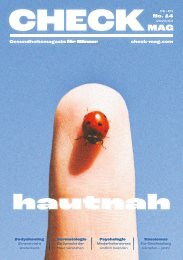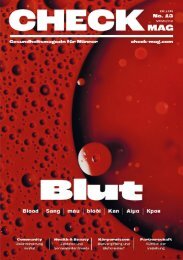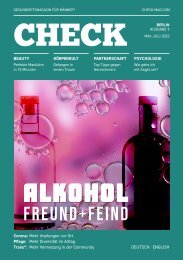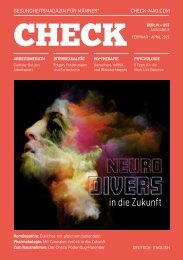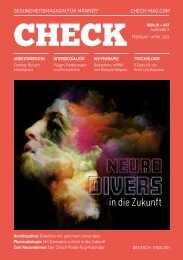CHECK Magazin - Gesundheitsmagazin für Männer No.11
Das Streben nach Leistung, Produktivität und Gewinnmaximierung steht im Fokus unserer modernen Arbeitswelt. Im heutigen Arbeitsalltag wird ein hohes Maß an Flexibilität, Kreativität, Anpassungsvermögen sowie ständige Verfügbarkeit und zugleich emotionale Belastbarkeit verlangt. Kognitiv und psychosozial werden wir stark herausgefordert. Es ist schwer, die Balance zwischen Über- und Unterforderung zu finden – beides ist gesundheitlich schädlich.
Das Streben nach Leistung, Produktivität und Gewinnmaximierung steht im Fokus unserer modernen Arbeitswelt. Im heutigen Arbeitsalltag wird ein hohes Maß an Flexibilität, Kreativität, Anpassungsvermögen sowie ständige Verfügbarkeit und zugleich emotionale Belastbarkeit verlangt. Kognitiv und psychosozial werden wir stark herausgefordert. Es ist schwer, die Balance zwischen Über- und Unterforderung zu finden – beides ist gesundheitlich schädlich.
Erfolgreiche ePaper selbst erstellen
Machen Sie aus Ihren PDF Publikationen ein blätterbares Flipbook mit unserer einzigartigen Google optimierten e-Paper Software.
Partnership<br />
Let’s imagine ourselves on a beautiful day spreading our towel at a secluded bathing<br />
spot – say by the Atlantic. We likely have several ideas about how to spend our time<br />
here. Read a book, munch on a sandwich, take sexy photos for social media or even<br />
go for a swim. But if the red flag is hoisted on the beach, the latter won’t likely<br />
happen. After all, who’d step into a potentially ankle-cracking surf only to be<br />
dragged into the wild current of the open sea? So it’s sandwiches and selfies.<br />
But why don’t the proverbial red flags keep us from entering into a relationship<br />
with people who we actually know pose a threat to us on various levels?<br />
ENGLISH<br />
GET OUT BEFORE IT’S TOO LATE<br />
Getting out of a toxic relationship is a long and painful process. Not least because<br />
you want or have to suppress your own participation in the events in order to be<br />
able to continue to function. Shame and feelings of guilt also play a role: how can<br />
I be so stupid and let this happen to me? Am I to blame for them behaving this<br />
way? What’s wrong with me? The good news is that if you ask yourself these<br />
questions more than once, the odds are very high that you are a victim. In<br />
that case you still have the chance to pull yourself up and literally run for<br />
your life. Isn’t the author exaggerating here? No! Because the bad news is:<br />
too many victims live in toxic relationships and the trend is increasing –<br />
according to the Federal German Criminal Police Office. Of the 148,031<br />
victims of domestic violence recorded in 2020, most were victims of<br />
intentional simple physical harm (91,212), followed by threats, stalking<br />
and coercion (33,022) and dangerous, serious physical harm or<br />
such resulting in death (total 18,097). The number of victims in completed<br />
murder and manslaughter was 158, 132 female and 26 male.<br />
Author: Torsten Schwick<br />
FOTO: Unsplash, ©Anh Tuan<br />
WHAT HAS RUINED YOU?<br />
Let’s take a step back and ask ourselves: how do you get into a toxic<br />
relationship and how do you recognize a toxic partner? The answer is not<br />
up lifting, because toxic people have learned to hide their true selves in such<br />
a way that it’s often only later that you realise how they really are. They may<br />
initially present themselves as exceptionally calm and willing to com promise,<br />
as kind and generous. They pro bably even appear as the saviour in need, as the<br />
person you’ve been waiting your whole life for, or as the one person who finally<br />
truly understands you. What then happens to the future victim is like in a cheesy<br />
movie: they blossom, open their heart, are in love and feel extremely comfortable<br />
and protected and at home with the future perpetrator. But toxic people are<br />
like poisonous spiders. They must first wrap their victims in their sweet and sticky<br />
web before paralysing and sucking them dry until there is nothing left. The first bite<br />
may feel like doing something you don’t want to do. For example, cancelling dates<br />
with friends because the toxic person doesn’t get along with them and if you still see<br />
them alone, the person gets mad. Or having sex when you’re not in the mood, because<br />
if you don’t, the person will start gushing about how good sex with their ex used to be.<br />
The motivation is crucial here: why do you act according to the ideas of the toxic<br />
person? Because you don’t do it to make them happy, but not to upset them. A non-toxic<br />
person would offer to do something else while you’re seeing your friends and meet up<br />
for a glass of wine afterwards. And then see if you feel like having sex again. But if you are ▶<br />
<strong>CHECK</strong> BERLIN #11 33










